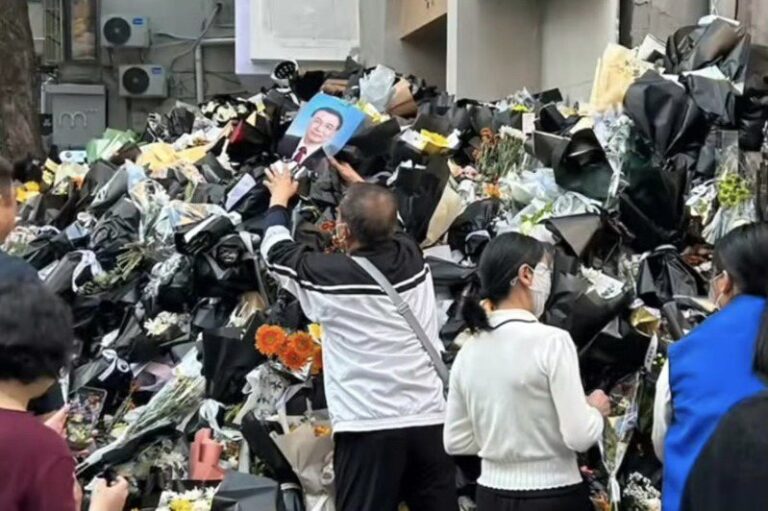
Former Prime Minister of Chinali keqiangThe sudden death on the 27th caused spontaneous mourning across the country. The outside world is worried about whether this will lead to a third incident.Tiananmen SquareDid the incident occur? In this regard, Yi Fuxian, a senior researcher at the University of Wisconsin-Madison, published an analysis article in the Voice of America on the 31st, saying that “Li Keqiang’s death will not cause a political earthquake.” Because China is already very old in terms of population structure. He believes that the demographic structure determines that China will have “frequent small chaos but no major chaos” in the future.
Yi Fuxian said that the death of Zhou Enlai in 1976 gave rise to the “April 5 Tiananmen incident”, and the sudden death of Hu Yaobang in 1989 also “4th JuneTrigger for Tiananmen incident. Because of these historical memories, some people hope that the tribute paid to Li Keqiang will ignite another political movement, but China’s demographics, economic structure, and political mentality are already very different.
The article stated that youth aged 15-29 have the highest reproductive and economic vitality, the highest political enthusiasm, and the highest war effectiveness. When the population proportion between 15–29 years old exceeds 28%, it can be called a “youth boom”.
The youth proportion in Taiwan and South Korea increased from 25% in 1966 to peaks of 32% and 31% in the early 1980s. The disposable income of residents exceeds 65% of GDP, and civil society is active. The economy is growing rapidly, enthusiasm for democracy is increasing, and democratic and student movements are growing one after another. Both places completed political transition in 1987, and the average age is only 25 and 26 years.
In 1989, the proportion of youth in China was up to 31%, and the average age was less than 25 years. The “June 4 Incident” also occurred in the same year. But in 1989 there was no youth wave in Xinjiang and the society was relatively stable. It was not until 2009 that a “youth wave” appeared in Xinjiang, with the youth proportion reaching 32% and the average age being less than 26 years. The “Fifth of July Incident” broke out that year.
Yi Fuxian pointed out that for decades, some Chinese intellectuals and Western politicians have been eager to see China return to the 1989 democratic movement. However, the opposite happened. The “White Paper Movement” in November 2022 to protest against the COVID-19 evacuation policy lasted only half a month.
He believes that Chinese society is becoming more and more rigid for several reasons, the three most important of which are:
1. The “youth wave” in 1996 has subsided. In 2023, the proportion of young people in China is only 17%, and the average age is more than 42 years old, and will reach 52 years old in 2040;
2. The ratio of disposable income of Chinese residents to GDP has fallen from 62% in 1983 to 43% now (the international community’s share is 60–70%). Government is getting bigger and bigger, and society has become fragmented;
3. The Chinese government takes advantage of others and elevates all “small chaos” to the level of regime security.
The article states, “Just as it is difficult for women over 45 to get pregnant, it is difficult for a society with an average age of over 40 and a youth proportion of less than 20% to achieve political change in 2019. “The movement ended in failure, 2 million people participated in the Hong Kong anti-extradition bill, partly because the average age is more than 44 years old and the youth proportion is less than 16%, which means we have entered ‘political menopause’. Have done.”
Yi Fuxian said that the decline of young people has only reduced enthusiasm for democracy, and the one-child generation, which lacks the spirit of challenging power, needs more attention and guidance on family security “and little Needs to be pink. Government and parents. The elderly are satisfied with the status quo, while parents of only children have to rely on the powerful government to provide security, social security and medical insurance.
Therefore, in recent years, many mass organizations supporting the government have emerged in China, such as “Chaoyang Mass” and “Xicheng Aunts”. Yi Fuxian described the pro-democracy student organizations of 1989 as “acne”, a sign that they could give rise to new life; While organizations such as “Chaoyang Mass” and “Zicheng Aunt” are “age spots”. “The acne is gone, but the age spots remain.”
Yi Fuxian pointed out that the Northeast, which has the largest elderly population in China, is most supportive of the government. “Today’s Northeast will be the future of the entire country.” Even if China were to experience the kind of turmoil that occurred in Russia in the 1990s, the vast majority of old people would soon support a Putin-style strongman to stabilize society. Population decline and economic decline do not necessarily lead to political collapse. The Tibetan population began to decline in the 8th century, but its political system continued for more than 1,000 years.
Yi Fuxian believes that the demographic structure determines that China will have “frequent small chaos but no big chaos” in the future. For the Chinese government, what needs to be worried about is not the security of governance, but the social rigidity and loss of vitality caused by aging and a declining youth ratio. Therefore, Chinese authorities must have sufficient political security to relax social controls to enhance social and economic vitality and increase fertility.
China(TagstoTranslate)Tiananmen(T)Li Keqiang(T)June 4